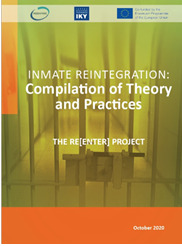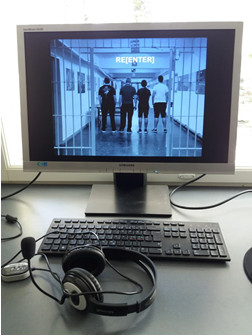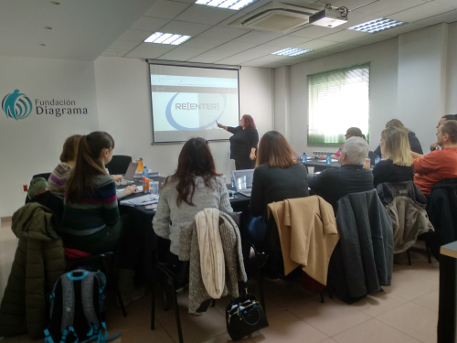![Re[Enter] Re[Enter]](https://www.fundaciondiagrama.es/sites/default/files/boletin/reeenter_boletin.jpg)
The RE[ENTER] project seeks to strengthen the capacities of professionals and volunteers working with young people and adults in conflict with the law both whilst they are in detention and following their release, with the goal of facilitating their reintegration into society and the labour market. This project is financed by the National Greek Agency within the framework of the Key Action 2 of the Erasmus+ Programme.
The handbook
|
|
The countries that comprise the European Union periodically plan, carry out, and evaluate different actions in custodial centres with the goal of encouraging social rehabilitation and reintegration. One of the main objectives of this project has been studying and bringing together the actions and interventions that have demonstrated their effectiveness in the different participating countries.
Sharing this knowledge and experience makes implementing similar measures easier in the judicial systems of other countries, thus supporting the successful reintegration of those in conflict with the law.
The handbook produced within the framework of this project, ‘Inmate Reintegration: Compilation of Theory and Practices’, gathers several of these successful interventions from countries participating in the RE[ENTER] project: Greece, Italy, Cyprus, Romania and Finland.

In this way, the manual fulfils its purpose of contributing to the dissemination of good practices, both amongst the project partners and amongst other professionals and entities that can consult it. It is aimed at professionals and volunteers working in the processes of rehabilitation and reintegration of people who are completing or have completed custodial sentences.
National trainings
|
|
In recent months, project partners have carried out training sessions, both in person and online, for professionals, volunteers, and students from their respective countries, to present them with the knowledge and experience acquired within the framework of the project, as well as the good practices of different countries collected in the handbook. Amongst the different national trainings, there are the following:
• In Greece, Freedom Gate Greece and the University of Thessaly organised a virtual event in March which was very well received, leading to the organisation of a second one in April. These events gathered academics as well as professionals from the criminal justice system, including from various penitentiary centres within the country.
• In Spain, Fundación Diagrama organised an online course in April which was carried out by professionals from various juvenile detention centres, thus gaining specialised knowledge and examples that can help in their daily work with young people.
• In Portugal, IPS Innovative Prison Systems organized a webinar in April aimed at providing information related to working in a prison context and interacting with inmates, which targeted future professionals who will work within prison establishments, such as volunteers, interns, and students of related areas (e.g. criminology, sociology, psychology, amongst others).
• In Finland, the Silta-Valmennus Association gave training to the organisation’s staff and the members of its network, a total of 47 professionals amongst whom there were counsellors, mentors, teachers, project workers, managers, and directors. They carried out two sessions in person (one of which took place in the Riihimäki prison) and three online.

• In Cyprus, C.I.P Citizens in Power gave online training in February to 12 trainers who had the opportunity to get to know the project’s good practices and create synergies that can lead to new projects for the benefit of people serving custodial sentences.
• In Romania, European Strategies Consulting organised a training over two days in March for 48 students from the University of Bucharest, future professionals in the project's field, interested in getting to know the theory and good practices researched.
Freely accessible materials
|
|
Moreover, the project has compiled materials from the online training, which are freely available on the platform of partner IPS Innovative Prison Systems for any professional or organisation interested.
Partner meetings
|
|
The most recent face-to-face partner meeting of the RE[ENTER] project took place in Madrid in February 2020. In this meeting the partners planned the creation of the handbook and the training materials.

The following partner meetings took place online, due to the situation brought about by the COVID-19 pandemic. The partners adapted to continue with their established plan, collaborating in the process of the creation of the project’s products and their subsequent use and dissemination.
Website and Facebook
|
|
You can find additional info about the RE[ENTER] project on its website or Facebook page
Partners
|
|
Coordinator
- Freedom Gate Greece, Greece
Partners
- IPS_Innovative Prison Systems, Portugal
- Fundación Diagrama, Spain
- Cirie Settimo Chivasso Territorial Committee, Italy
- Citizens In Power, Cyprus
- University of Thessaly, Greece
- SILTA Valmennus, Finland
- Asociația Județeană Sportul Pentru Toți Suceava, Romania
- European Strategies Consulting, Romania
|
|

The European Commission’s support for the production of this newsletter does not constitute an endorsement of the contents, which reflect the views only of the authors, and the Commission cannot be held responsible for any use which may be made of the information contained therein.
|
|
|
|